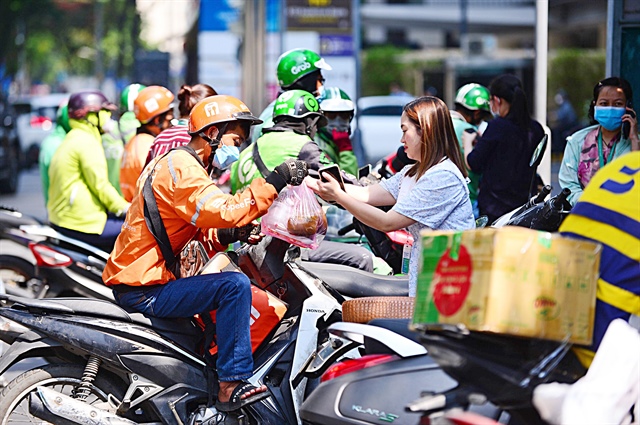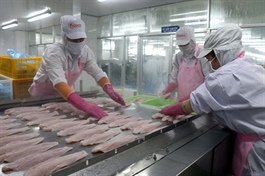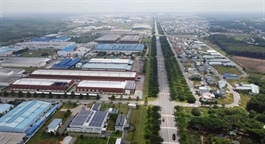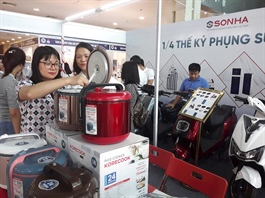Food delivery unprofitable in Ho Chi Minh City
Food delivery unprofitable in Ho Chi Minh City
The partnership between restaurants and food delivery platforms in Ho Chi Minh City is falling apart as it appears to yield no benefit for either party.

A driver delivers food to a customer at a building in District 1, Ho Chi Minh City. Photo: Quang Dinh / Tuoi Tre |
Believing that the food delivery apps take a significant portion of their earnings while offering minimal benefits, numerous eateries and restaurants in Ho Chi Minh City are opting to sever ties or reduce their involvement with these platforms.
Nguyen Dinh, who operates over 20 food restaurants in the city’s Tan Binh District, initially anticipated a surge in sales by selling online through various apps such as Baemin, GrabFood, GoFood, and ShopeeFood, in addition to in-house dining.
In the beginning, he registered each of his restaurants on almost all of these food delivery apps.
The commissions incurred on orders via these apps vary depending on location, the restaurant’s agreement, and the duration of cooperation, typically ranging from 25 percent to 27.5 percent of each order’s value.
This commission rate was lower, around 15 percent to 20 percent, in previous years before gradually increasing.
“Initially, many customers placed orders when the apps ran extensive promotions, but over time, this led to a situation where restaurant owners had to provide even more generous discounts to attract customers,” said Dinh.
“I had to invest in advertising and offer discounts of 20-30 percent to secure a prominent position in the app’s online listings.
“The more we relied on the app and spent heavily on promotions, the higher the revenue, but the profit margins decreased.”
Consequently, Dinh decided to remove his restaurants from some of the apps.
Tran Van Truong, director of Hoang Gia Seafood International Trading Company Limited, said that their long-standing company, due to dealing with high-value orders, previously negotiated with food delivery platforms for commissions ranging from five percent to 10 percent.
However, recently, many delivery apps have requested an increase in fees, ranging from 15 percent to even 25 percent, forcing the company to reduce its reliance on these apps for deliveries as the business is facing a decrease of up to 30 percent in order numbers compared to previous prosperous periods.
“Continuing our business on apps demanding significant commissions is incredibly challenging,” Truong stated.
Alternative paths
Discussing the cost structure, Tran Quoc Thinh, founder of the 109 chicken hotpot chain located in Phu Nhuan District, said about 15 percent goes for premises, 12 percent for staff, 40-45 percent for raw materials, and 10 percent for other expenses.
Consequently, if the restaurant has to pay a 20-25 percent commission for delivery apps, it leaves them with a profit margin of only two to five percent, or potentially even results in losses, as Thinh pointed out.
Additionally, he mentioned that delivery apps retain customer information and do not share it, making it nearly impossible to engage with customers directly.
Thinh said that the company is striving to limit the percentage of orders delivered through the apps to around 10-15 percent.
In exchange, the hotpot chain is concentrating on establishing a customer care department, developing a Facebook page, website, hotline, and other means of direct customer interaction.
They are lowering sales prices and offering free shipping.
Many eateries and restaurants are exploring similar strategies to break free from their reliance on apps by redirecting their funds toward on-site advertising and promotions rather than paying a 25-percent commission.
“I’m actively establishing our own sales channel and offering customer discounts, such as free shipping, for direct orders,” Truong from Hoang Gia Seafood said.
Ha Binh Kha, proprietor of Hai Chau restaurant in Go Vap District, shared that he is attempting to wean customers off apps by raising prices by 10 percent for app orders while slashing prices for in-store purchases and offering free delivery.
Operating in the red
Apart from taking a share of the revenue from restaurant orders, tech-based delivery services are charging additional fees on deliveries made by drivers.
In a similar fashion to restaurants, delivery drivers are also experiencing reductions in earnings due to high commission rates of up to 25 percent imposed by the app companies.
For instance, with a delivery order valued at VND16,000 (US$0.65), the driver relinquishes a quarter of that amount to the firm, retaining only VND12,000 ($0.49).
Despite that, food delivery operators stated that they are grappling with competition and a challenging economic situation.
For instance, German-owned South Korean app Baemin has streamlined its operations and even contemplated exiting the Vietnamese market.
Similarly, homegrown Loship has faced a backlash from several restaurant and eatery owners for withholding payments and issuing delayed refunds.
The apps attribute the considerable strain on the food delivery investors to customers’ habituation to discounts and promotions.
Heavily investing to gain market share and compete with rivals has placed delivery apps in a challenging situation.
As consumers tighten their budgets, these apps are forced to reduce promotional activities due to financial constraints.
The apps themselves are grappling with financial losses, as explained by a representative from a delivery service.
The representative noted that in well-developed markets such as the United States and South Korea, many leading apps are also experiencing financial losses.
Another representative from a different food delivery app stated that they continually have to infuse funds into technology investments and system operations.
However, following a period of robust growth, purchasing power has declined significantly, resulting in a sharp drop in revenue since the beginning of this year.



























